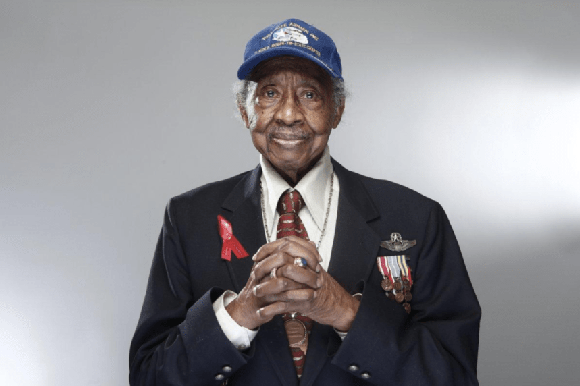Floyd Carter, One of the Last Tuskegee Airmen, Dies at 95
Style Magazine Newswire | 3/16/2018, 11:38 a.m.
Source: BlackDoctor.org
Floyd Carter Sr., one of the last of the Tuskegee Airmen, decorated veteran of three wars and 27 years with the NYPD died Thursday at age 95.
He served and flew in WWII, he served and flew in the Korean War, and he served and flew during the Vietnam War. He leaves a long legacy as a groundbreaking hero pilot and was honored in 2007 with the Congressional Gold Medal by President Bush for breaking the color barrier in Tuskegee.
The Tuskegee Airmen were the first African-American military aviators in the United States Armed Forces. During World War II, black Americans in many U.S. states were still subject to the Jim Crow laws and the American military was racially segregated, as was much of the federal government. The Tuskegee Airmen were subjected to discrimination, both within and outside the army.
Before the Tuskegee Airmen, no African-American had been a U.S. military pilot. In 1917, African-American men had tried to become aerial observers, but were rejected. African-American Eugene Bullard served in the French air service during World War I, because he was not allowed to serve in an American unit. Instead, Bullard returned to infantry duty with the French.
The racially motivated rejections of African-American recruits sparked more than two decades of efforts by African American leaders to enlist and train Blacks as military aviators. The effort was led by such prominent civil rights leaders as Walter White of the National Association for the Advancement of Colored People, labor union leader A. Philip Randolph, and Judge William H. Hastie. Finally, on April 3rd 1939,Appropriations Bill Public Law 18 was passed by Congress containing an amendment by Senator Harry H. Schwartz, designating funds for training African-American pilots. The War Department to put the money into funds of civilian flight schools willing to train black Americans.
Floyd joined the Army Air Corps in 1944, and was commissioned a year later as a 2nd Lieutenant bombardier navigator.
In 1946, he received his pilot wings and transferred a year later to the Air Force Reserves. By the end of his tenure in 1974, he was commander of the 732nd Military Airlift Squadron at McGuire Air Force Base in New Jersey.
Carter rose to the rank of Air Force lieutenant colonel years after joining the group of African-American pilots at Tuskegee University.
He met his wife Atherine there, where the Alabama native was working as part of an all-female repair crew. The two got married at the air base in 1945.
In addition to serving during World War II, Carter flew during the Korean and Vietnam wars and led the first squadron of supply-laden planes into Berlin during the famed Cold War airlift of 1948-49.
During the Tet Offensive, Carter flew U.S. troops and supplies into South Vietnam.
“He’s got a little history,” said his son Floyd Jr. “We were blessed, we sure were. He went from what I call the outhouse to the fine house. The Lord blessed him.”
After the war, Carter joined the NYPD in 1953, earned his detective’s gold shield within three years, and retired in 1980.
His NYPD duties included work as a bodyguard for visiting heads of state, and Carter spent time with Cuban leader Fidel Castro and Soviet head Nikita Khrushchev, recalled his son Floyd Jr.
He earned a half-dozen citations for his outstanding police work, and survived a number of shootouts with armed bandits.
“We mourn the loss of a true American hero,” read a tweet from the 47th Precinct in his adopted home of the Bronx. “Our community & nation has lost a giant.”






